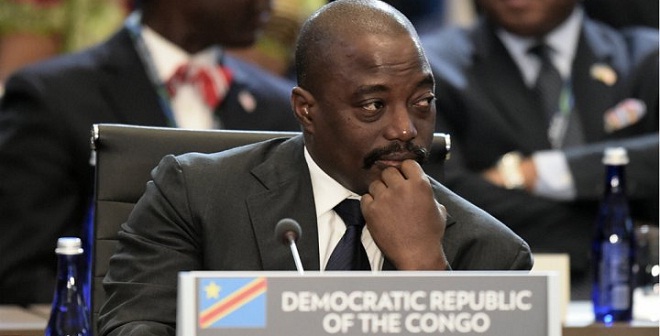
Kinshasa, DR Congo | AFP |
Participants in the Democratic Republic of Congo’s “national dialogue” agreed Monday, in the absence of the main opposition coalition, to push back to April 2018 the presidential election due to take place before the end of the year.
The accord was announced after the EU threatened sanctions if the country did not hold elections in 2017, and condemned recent deadly violence between opponents and supporters of President Joseph Kabila.
The deal, reached during talks in Kinshasa, envisages Kabila remaining in power until 2018 despite the fact that his mandate is due to end in December.
“The presidential, legislative and local elections (will be held) six months after they are convened on October 30, 2017,” former Togolese prime minister and talks facilitator Edem Kodjo said in a statement.
“The presidential election will take place on April 29, 2018 and the transfer of power from the outgoing president to the incumbent will take place on May 9,” opposition negotiator Vital Kamerhe told AFP.
The leader of the parliamentary group representing Kabila’s People’s Party for Reconstruction and Democracy (PPRD) confirmed the announcement.
“The election will be held in 2018,” Ramazani Shadari said, adding that “all the details” of the deal would be disclosed on Tuesday.
The main opposition coalition — “Rassemblement” (Gathering) — has boycotted the talks, however, branding them a ploy by Kabila to stay in power beyond the end of his term.
Even prior to Monday’s accord, the coalition had made clear that it would not accept any decisions announced by dialogue representatives.
It has also called for a general strike on Wednesday across the vast central African nation, to give Kabila a “yellow card”.
Threat of sanctions
Should the agreement hold, a new government would be set up, with the key post of prime minister handed to an opposition figure, chief negotiator Kodjo said.
Protests against Kabila have also seen demonstrators chant down Kodjo — seen as biased towards the president.
Kabila’s ex-campaign director Kamerhe, who was expelled from the ruling party in 2008 when he was speaker of parliament, is seen as the favourite for the post.
Political tension has gripped the country since Kabila’s disputed re-election in November 2011.
The national dialogue began on September 1 between the ruling majority, representatives of civil society and a minority fringe of the opposition to try to sketch a way forward.
Later that month more than 50 people died in clashes in the capital Kinshasa as the opposition called on Kabila to step down.
‘Deeply concerned’
European Union foreign ministers on Monday said the bloc was “deeply concerned by the political situation (and)… strongly condemns the acts of extreme violence.”
A “dialogue must lead to the holding of presidential and legislative elections as soon as possible in 2017”, a statement said, as the ministers meeting in Luxembourg threatened sanctions.
“The EU will use all the means at its disposal, including individual restrictive measures against those responsible for serious human rights violations, those who promote violence and those who would try to obstruct a consensual and peaceful solution to the crisis,” the statement added.
EU foreign affairs head Federica Mogherini will now study the issue, it added.
Diplomatic sources told AFP last week the bloc was looking at people close to Kabila as possible sanctions targets.
Shortly after the deadly September violence, Washington put two Kabila allies — army commander Major General Gabriel Amisi Kumba and former inspector of police General John Numbi — on its sanctions blacklist for undermining democracy.
Kabila first took office in 2001, and in 2006 a new constitutional provision limited the presidency to a two-term limit which expires in December.
At the beginning of this month, the Democratic Republic of Congo’s electoral commission said it would seek to delay a vote until November 2017.
 The Independent Uganda: You get the Truth we Pay the Price
The Independent Uganda: You get the Truth we Pay the Price



